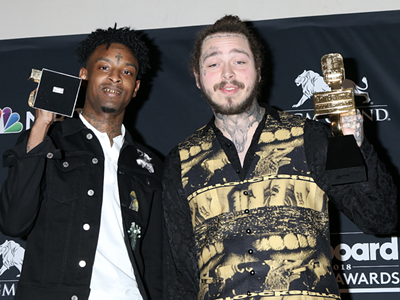Deer Tick appears to have made it through the thick of it.
The band has survived a decade of self-destruction, self-sabotage, and the pretentious menagerie of indie rock.
For the rowdy, dysfunctional rockers, survival has little to do with luck or right place, right time happenstance and everything to do with having maintained their reputation as Deer Tick — the band that gets fucked up but never really fucked up. More than maintenance, though, the Providence, R.I. quartet have found momentum far removed from rock 'n' roll's thirst for glam, glory, and expiration. In fact, they're pretty damn well-adjusted.
2017 ushered in a new era for Deer Tick following an incredibly uncertain four-year hiatus. Deer Tick Vol. 1 and Deer Tick Vol. 2 find the band facing their stylistic imbalance head-on, dishing out both an acoustic and electric serving of its alchemic duality. It takes a double dose of frontman John McCauley's malleable rasp to fully understand his career-long aesthetic that is in constant flux between weathered and yielding, forceful and sober — imbued, always, with a bit of sadness.
"I hid it all behind my eyes/ Somewhere in a fog of a million pleasantries/ I kept my secret safe inside," McCauley confesses in Vol. 1's dreamy and sparse opener, "Sea of Clouds." Cut to Vol. 2 and we find a more anxious transparency with "Look How Clean I Am" — "Waitin' for the sweat to break/ Changing all my covers/ To the best that I can be" sings a confrontational McCauley, "I'm staring down the barrel/ Of a well-adjusted legacy."
Ketchup and mustard grace the cover art, as if to suggest that Vol. 1 and Vol. 2 are either ingredients in the same recipe or divisive, complimentary flavors. An ambitious endeavor for a band whose future was threatened by time, space, and change of plans, the double album proves that Deer Tick is more interested in a natural progression than a prescribed one.
McCauley and guitarist Ian O'Neil took a break from their double lives to chat about settling down, cleaning up, and why their short-lived Nirvana cover band Deervana was DOA.
Metro Times: John — you recently said of Deer Tick Vol. 1 and 2 that "you just wanted to do something a little unconventional." Has that, in some way, been the goal since the beginning?
John McCauley: I suppose so. We've always followed our muse wherever that took us. It was never about what's hip, and if somebody wanted to peg us as one thing, our first instinct was oftentimes to go and do the opposite.
MT: How has the word "unconventional" changed in terms of the band since its inception?
McCauley: I guess our approach to sustaining our career is unlike a lot of other bands. We could probably tour for a long time without putting out a new record. Not that that's something we'd consider, but for us it's really about our shows — not so much about having some lucrative record deal or anything like that.
Ian O'Neil: I would imagine from an industry perspective, we've engaged in some unconventional decisions, but we've always done what our instincts have led us to do.
MT: Four years separated Negativity and 2017's volumes. Was it always the intent to release two separate records? Were there any experiences that encouraged the reunion and inspired the material?
McCauley: Once I started writing it was pretty clear to me that I wanted to make two separate things. The idea of two records was hatched early on. A few months before we went into the recording studio we played our annual Newport Folk Festival afterparties. That year was a particularly rejuvenating experience for me and the band for some reason. It made us really want to do the records.
O'Neil: John kind of said it all, but from my perspective, doing two albums the way we did may have been the only way to pull us back together. It took a unique mission to get us up to another level, musically.
MT: How does the life of a rock band change when fatherhood, marriage, and mortgages come into play?
McCauley: I don't like to be away from home for too long anymore. It sucks missing birthdays and stuff like that. It's made me appreciate my job as a musician and songwriter a lot more.
O'Neil: Being a husband and starting a family comes with some pressure to be home, but by and large I just have to separate music and business from time spent with my wife. That being said, she encourages me to work as much as possible. She shares the sacrifice.
MT: The Twice is Nice tour celebrates the many sides of Deer Tick. One acoustic set, followed by intermission and an electric set. Does this require a different level of preparation? Why not integrate the songs into one set?
McCauley: Basically, our sound checks take all damn day and we never have a chance to eat dinner. It's a pretty good amount of work putting on a show like that. Besides wanting the show to reflect how we released the records, I don't really want to be running around, spraying beer everywhere during a song like "Let's All Go to the Bar" with our delicate folk instruments scattered all around the stage.
MT: I learned that "It's a Whale" from Vol. 2 is written from the perspective of a men's rights activist. What's the key to writing a euphemistic/sneakily political punk song? Is there a pressure/responsibility as an artist to address the orange elephant in the room?
McCauley: The words came pretty quick for that one. Not that there's too many lyrics to that song. I suppose that sometimes it's just too irresistible to lampoon a movement like that by screaming your head off.
O'Neil: I feel no pressure to speak up. However, our politics are clear and inclusive. We don't tolerate any discriminatory behavior or violence. In terms of writing, if you aren't personally moved to address any singular topic, don't try for fashion's sake.
MT: Was there ever a point where you considered Deervana fulltime?
McCauley: No, absolutely not. We got an offer to play a show for more money than Deer Tick ever made in a single show. That was the moment we decided that we'd had enough of Deervana.
MT: Do you have a favorite Nirvana/Kurt Cobain conspiracy theory?
McCauley: Nah, I don't buy any of that stuff.
O'Neil: I heard he was about to do an album with Michael Stipe when he passed. I would buy that!
MT: In a 2012 interview with Noisey, the journalist said, "As a band, Deer Tick is pretty much a band about alcohol." As a band in 2018, what is Deer Tick about?
McCauley: Well, I still love my beer, but nowadays it's more about putting on a great show, instead of putting on a shitshow. I'm at a place in my life where I'm willing to give it my all every night. As long as there's no technical problems, I'm going to do it all and do it to the best of my ability.
O'Neil: That was as inaccurate then as it is now. But I will say we have made music journalists' jobs easier by perpetuating that image. Not much has changed, we still enjoy having fun with one another, but I firmly believe our music has always reflected our experience and it still does.
Deer Tick will perform at the Magic Stick on Monday, Feb. 26 at 7 p.m.; 4120 Woodward Ave., Detroit; 313-833-9700; majesticdetroit.com; Tickets are $25-$28.







